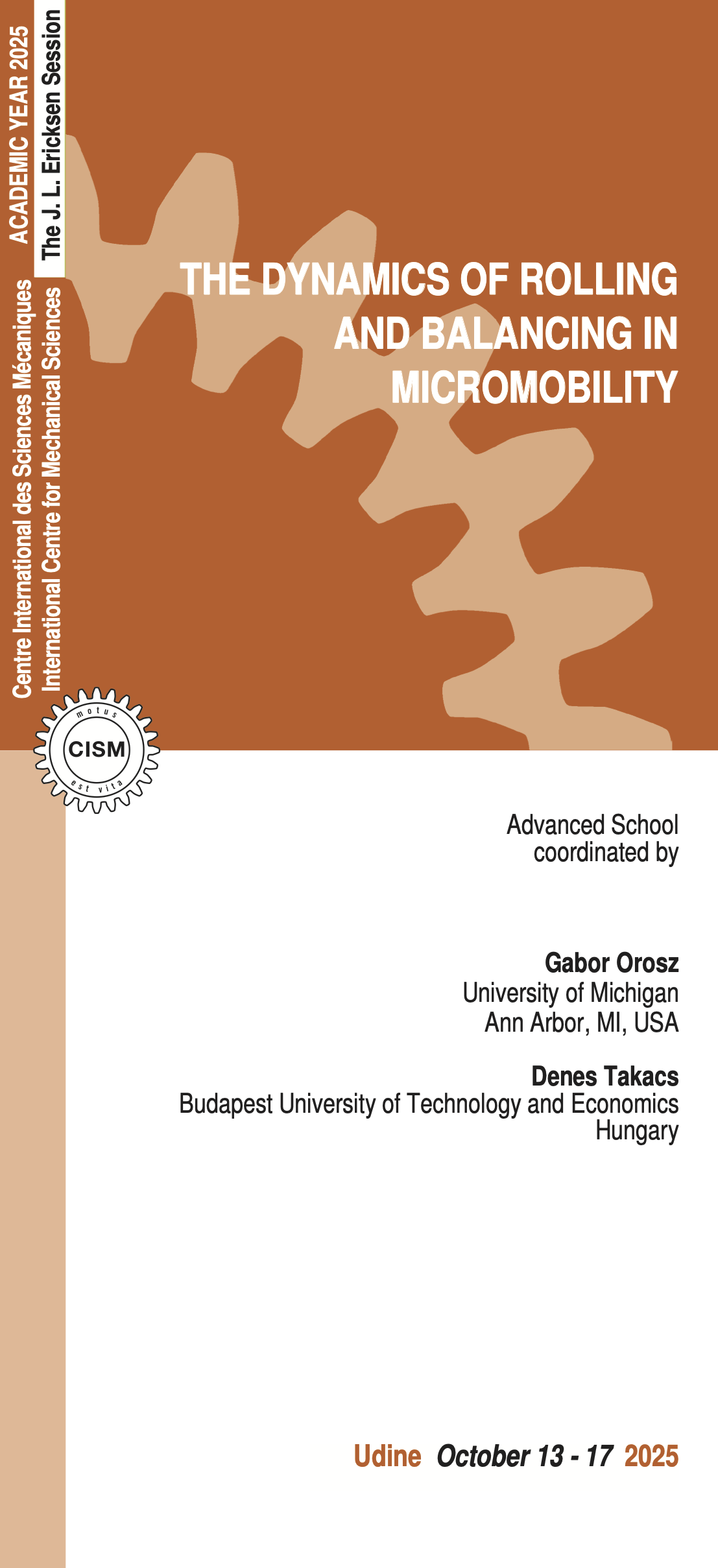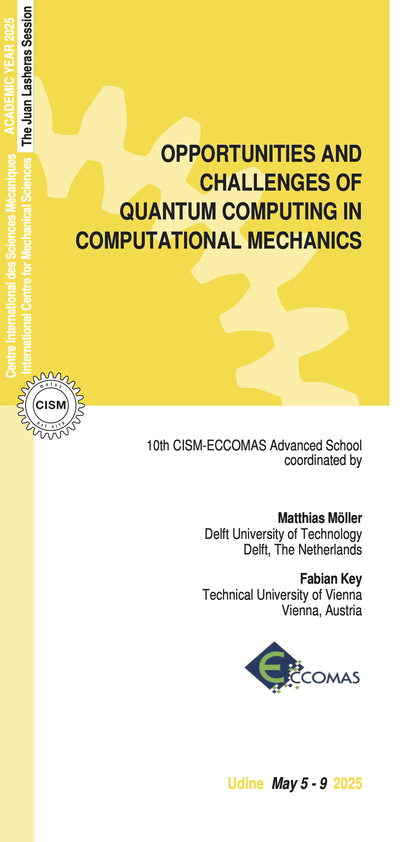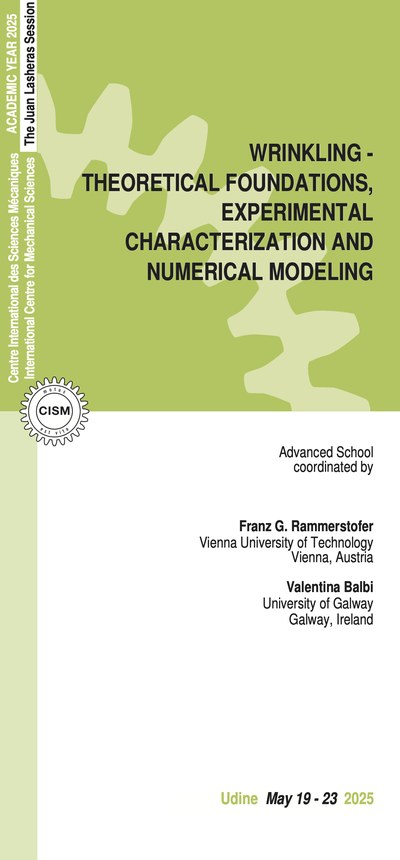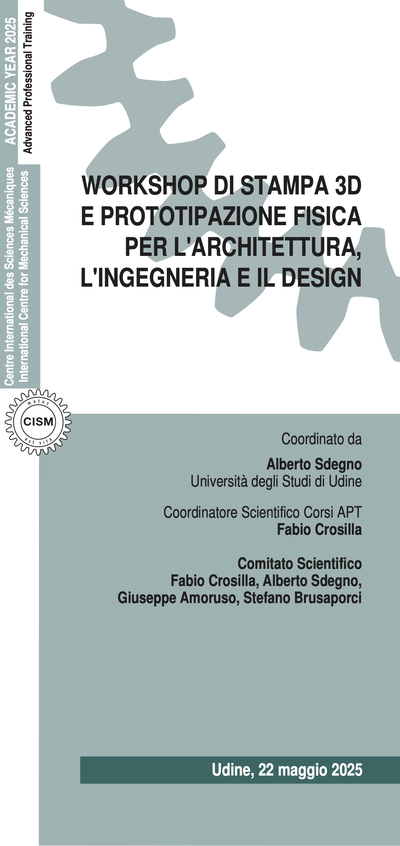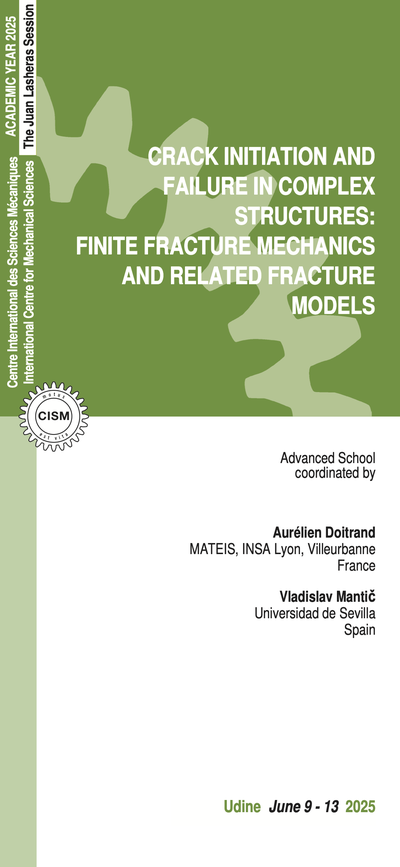The importance of micromobility has become relevant in the last decades since micromobility vehicles (electric scooters, bicycles, skateboards, unicycles, etc.) provide modern solutions for the last-mile problem of urban transportation. Although the invention of these vehicles dates back to the last century, and the analysis of their dynamics also began at that time, electrification changed the game. Higher speed and more agility characterize modern micromobility vehicles, while in the meantime, non-professional riders are using them on city roads in heavy traffic. Thus, the risk of serious accidents is high. Understanding the dynamics and control of e-bikes, scooters, skateboards, and unicycles is becoming more and more important.
The aim of this course is to give a perspective on the dynamics and control of micromobility vehicles. First, the classical mechanical modeling of the simplest nonholonomic systems will be presented. Starting from Newton’s second law of dynamics and introducing kinematic constraints, the mystic, speed-dependent dynamics of nonholonomic systems will be demonstrated via the analysis of the uncontrolled skateboard. The effect of human control on stability is investigated via the implementation of a linear state feedback with human reaction time. While single-track vehicles are highly unstable, with some forward speed, the system is easy to stabilize and control. The course will showcase the key fundamental results on this important topic.
The theoretical background of nonholonomic systems will be given via lessons on the Lagrangian approach extended for kinematic constraints. Then, the concept of pseudo-velocities will be introduced, and the Appellian approach will be presented. The differences between the aforementioned methods will be shown via the analysis of the spatial rolling problem of a rigid wheel. A simplified model of the electric unicycle will also be introduced. The analysis of nonholonomic articulated robotic vehicles will highlight how periodic excitations can be used for driving micromobility vehicles. Namely, the motion of the Twistcar (which is a very popular kids' cart) is analyzed, and forward and backward motions are identified depending on the amplitude, frequency, and phase of the excitation.
Rider modeling, path tracking, and stabilization of bicycles and e-scooters will also be presented. Modeling of the wobble mode of bicycles, including frame flexibility, transient tire-road contact forces, and the role of rider posture, will be investigated. The stability of e-scooters under braking will be identified, and different braking control strategies (ABS, optimal brake force distribution) will be highlighted. A Kalman-filter-based estimation of the tire-road friction potential and of vehicle-rider mass distribution will also be the subject of the course. The course will also discuss the development of automated single-track vehicles. Path-following control strategies will be analyzed, and experimental investigation of bicycle control will be showcased.
WB Qin, Y Zhang, D Takács, G Stépán, G Orosz, Nonholonomic dynamics and control of road vehicles: moving toward automation, Non Dyn, 110:1959-2004, 2022.
X Cao, DC Bui, D Takács, G Orosz, Autonomous unicycle: modeling, dynamics, and control, Mult Sys Dyn, 61:43-76, 2024.
JP Meijaard, JM Papadopoulos, A Ruina, AL Schwab, Linearized dynamics equations for the balance and steer of a bicycle: a benchmark and review, Proc Roy Soc A, 463:1955-1982, 2007.
AL Schwab, JP Meijaard, JDG Kooijman, Lateral dynamics of a bicycle with a passive rider model: stability and controllability, Veh Sys Dyn, 50:1209-1224, 2012.
Z Zhao, C Liu, Contact constraints and dynamical equations in Lagrangian systems, Mult Sys Dyn, 38:77-99, 2016.
J Xiong, N Wang, C Liu, Stability analysis for the Whipple bicycle dynamics, Mult Sys Dyn, 48:311-335, 2020.
DJN Limebeer, RS Sharp, Bicycles, motorcycles, and models, IEEE Cont Sys Mag, 26:34-61, 2006.
F Klinger, J Nusime, J Edelmann, M Plöchl, Wobble of a racing bicycle with a rider hands on and hands off the handlebar, Veh Sys Dyn, 52:51-68, 2014.
T Yona, Y Or, The wheeled three-link snake model: Singularities in nonholonomic constraints and stick-slip hybrid dynamics induced by Coulomb friction, Non Dyn, 95:2307-2324, 2019.
O Halvani, Y Or, Nonholonomic dynamics of the Twistcar vehicle: asymptotic analysis and hybrid dynamics of frictional skidding, Non Dyn, 107:3443-3459, 2022.
6 lectures on:
Modeling of the human rider and tire-road contact forces for two-wheeled vehicles; Stability analysis of the wobble mode; Vehicle handling and braking behavior; Effects of different rider postures and tire-road friction.
6 lectures on:
Nonholonomic systems; Gibbs-Appell equations; Voronets equations; Symmetry and relative equilibria of bicycle systems; AI for bicycle dynamics; Control of bicycles; Nonlinear dynamics of bicycles; Bifurcations and limit cycles.
6 lectures on:
Nonholonomic dynamics of multi-link articulated wheeled vehicles under periodic actuation; Dynamics of the Twistcar and the three-wheel snake; Experimental results, computational simulations and asymptotic analysis; Dissipation due to wheels’ resistance.
6 lectures on:
Nonholonomic systems; Geometric and kinematic constraints; Lagrange equations of the second kind; Appell-Gibbs equations; Dynamics of the rolling wheel in 3D; Modeling stability and control of human-ridden and automated electric unicycles (EUCs).
6 lectures on:
Modeling, stability analysis and control of bicycle dynamics; Modeling of riders; Passive rider models; Caster and gyroscopic effects; Effect of geometry, mass distribution and human control on stability.
6 lectures on:
Kinematic constraints; Mechanical models of simple nonholonomic systems; Derivation of equation of motion by the fundamental law of dynamics; Stability of skateboarding; Effect of human control on stability.
ADMISSION AND ACCOMMODATION
The course is offered in a hybrid format, allowing participants the flexibility to attend either in person or remotely via the Microsoft Teams platform.
Admission to on-site attendance is granted on a first-come, first-served basis to comply with the capacity of the lecture room.
Application forms should be submitted online through the website: http://www.cism.it. A confirmation message will be sent to participants whose applications are accepted.
Registration fees:
- Early Bird On-Site Participation: € 650.00 + VAT* - Deadline: August 13, 2025
- Late On-Site Participation: € 800.00 + VAT* - Deadline: September 30, 2025
- Live Streaming Online Participation: € 250.00 + VAT* - Deadline: September 30, 2025
On-site participation includes a complimentary bag, five fixed menu buffet lunches, hot beverages, downloadable lecture notes.
Online participation includes downloadable lecture notes.
Upon request, and subject to availability, a limited number of on-site participants can be accommodated at the CISM Guest House for € 35 per person per night. To request accommodation, please contact foresteria@cism.it.
CANCELLATION POLICY
Applicants may cancel their registration and receive a full refund by notifying the CISM Secretariat in writing (via email) no later than:
- August 13, 2025, for early bird on-site participation;
- September 13, 2025, for late on-site participation;
- September 30, 2025, for online participation.
No refunds after the deadlines. Cancellation requests received before these deadlines and incorrect payments will be subject to a € 50.00 handling fee.
GRANTS
A limited number of participants from universities and research centers who do not receive support from their institutions can request a waiver of the registration fee and/or free lodging.
Requests should be sent to the CISM Secretariat by August 13, 2025, along with the applicant's curriculum vitae and a letter of recommendation from the head of the department or a supervisor confirming that the institute cannot provide funding. Preference will be given to applicants from countries that sponsor CISM.
